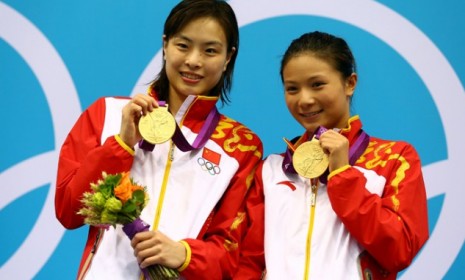China's Olympics training program: Abusive?
The country has become a sports powerhouse, but at a great cost to its athletes, many of whom are whisked from their families at a young age and kept in a brutal bubble

A free daily email with the biggest news stories of the day – and the best features from TheWeek.com
You are now subscribed
Your newsletter sign-up was successful
This week, Wu Minxia of China and her diving partner took the gold in the 3-meter synchronized springboard event at the London Olympics, becoming the first diver ever to win golds at three consecutive games. But her victory celebrations were cut short when her parents belatedly revealed some distressing news: Wu's grandparents had died a year ago, and her mother had contracted cancer eight years ago, all unbeknownst to the diver. The revelation cast a spotlight on China's state-run athletics program, which separates children from their families and controls every aspect of their lives, all in an effort to transform China into a global athletic power. Here, a guide to Wu's ordeal:
Why didn't Wu's parents tell her beforehand?
They didn't want to interfere with her training. "Wu called us after her grandmother died," Wu Jueming, her father, told The South China Morning Post. "I gritted my teeth and told her: 'Everything's fine, there aren't any problems.'" Wu's father says keeping his daughter in the dark was "essential" to her training, adding, "We never talk about family matters with our daughter." Wu's parents also concealed her mother's battle with cancer, and reportedly would have kept their daughter in the dark if the cancer had not gone into remission.
The Week
Escape your echo chamber. Get the facts behind the news, plus analysis from multiple perspectives.

Sign up for The Week's Free Newsletters
From our morning news briefing to a weekly Good News Newsletter, get the best of The Week delivered directly to your inbox.
From our morning news briefing to a weekly Good News Newsletter, get the best of The Week delivered directly to your inbox.
What role did China's government play?
Wu, 26, has been training daily at a diving camp since the age of six, and at 16 was whisked away from her family to a government-run sports institute. "She rarely saw her family, didn't attend school — didn't do anything but dive, all day, over and over again for this last decade," says Barry Petchesky at Deadspin. Her parents keep up with her by following her account on Weibo, the Chinese version of Twitter. They watched her perform in London from the stands, but didn't meet her in person before the event. "We've known for years that our daughter doesn't belong to us anymore," says her father. And Wu's story is "merely one chapter in a giant tome" about China's abusive athletics program, says Gabe Zaldivar at Bleacher Report.
How have people reacted?
In response to Wu's ordeal, Weibo erupted with criticisms of the Chinese government. "Apart from making people crazy, our Olympic strategy also makes people lose their humanity," one commentator said. The government has also been savaged for its cool treatment of slightly less-than-spectacular athletes, particularly its habit of officially congratulating gold-medal winners through its state news service, but ignoring competitors who merely win silver or bronze.
A free daily email with the biggest news stories of the day – and the best features from TheWeek.com
Will China reform its athletic program?
Probably not. China is currently leading the medal count, and its success is a source of "pride within Chinese political circles," says Martin Rogers at Yahoo Sports. "The debate over success vs. humanity is likely to remain just that," says Petchesky. "A debate."
Sources: Agence France Presse, Bleacher Report, Deadspin, Yahoo Sports
-
 How the FCC’s ‘equal time’ rule works
How the FCC’s ‘equal time’ rule worksIn the Spotlight The law is at the heart of the Colbert-CBS conflict
-
 What is the endgame in the DHS shutdown?
What is the endgame in the DHS shutdown?Today’s Big Question Democrats want to rein in ICE’s immigration crackdown
-
 ‘Poor time management isn’t just an inconvenience’
‘Poor time management isn’t just an inconvenience’Instant Opinion Opinion, comment and editorials of the day